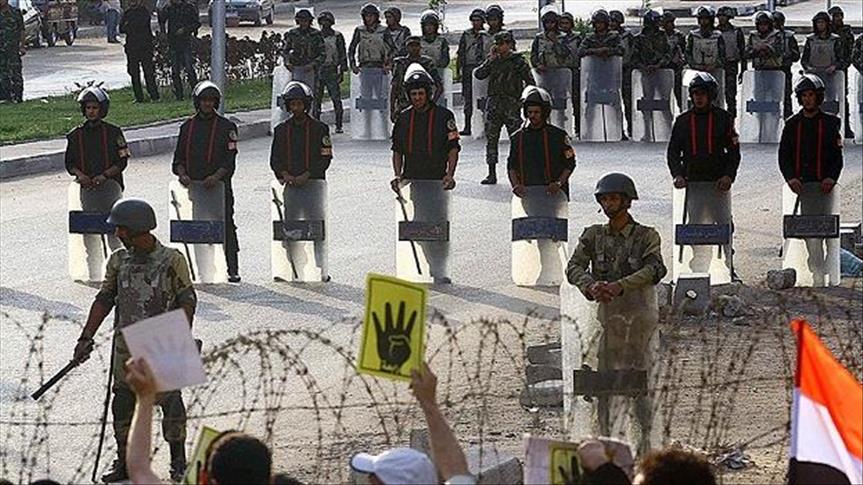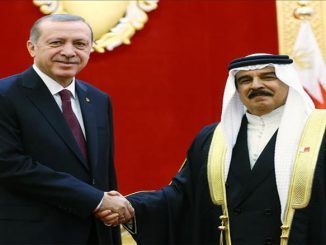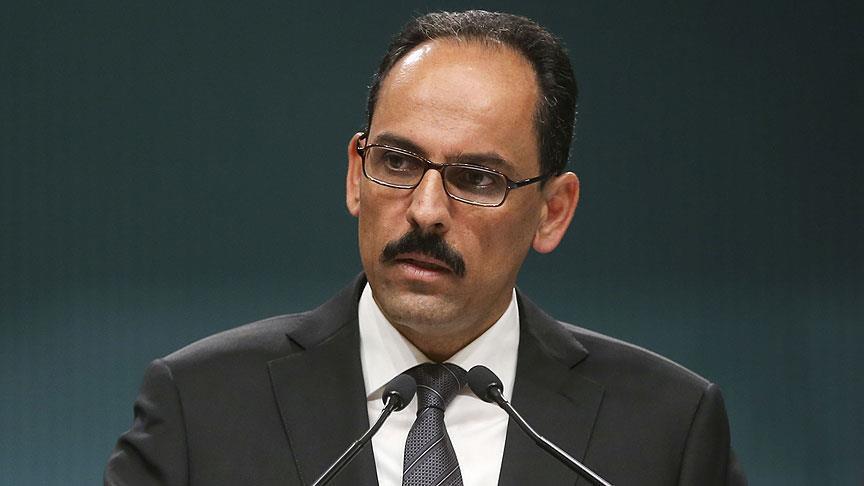
At the time when the coup plotters failed to mobilize the public opinion against the democratically elected regime in Turkey, the military coup in Egypt succeeded in inciting the public opinion against President Mohamed Morsi the first democratically elected president of Egypt.
Anadolu Agency published a report titled:”Comparing Turkey’s failed coup to Egypt’s successful one,” that compares between the military coup in the two countries.
In Egypt, Abdel Fattah al-Sisi, who was then Egypt’s defense minister, ousted Mohamed Morsi in a move supported by large swathes of the Egyptian public on July 3rd 2013, according to the Anadolu Agency’s report.
The military tanks were deployed overnight on the main streets of Cairo and army checkpoints were set up all over the country to prevent Morsi’s supporters from reaching Egypt’s squares to protest the coup.
However, Morsi’s supporters and members of his Muslim Brotherhood took to the streets for demonstrations and they organized sit-ins in Rabaa Al-Adawiya and al-Nahda squares.
But they were faced out with harsh crackdowns from the Egyptian police and military forces.Hundreds – maybe thousands -were killed and tens of thousands thrown behind bars, said AA.
One of the main features of the military coup in Egypt was the bloody coup confrontations in facing the democratic pro -Morsi supporters who were faced in the immediate aftermath with helicopter gunships opening fire on peaceful demonstrators.
The most notorious incidents, as documented by human rights organizations, is the violent evacuation of pro-Morsi’s peaceful sit-ins of Rabaa al-Adawiya and Al-Nahda square leaving hundreds — perhaps thousands dead.
“Unarmed protesters, including many women and children, were cut down in their tracks by army snipers,” said Anadolu Agency.
Moreover, the injured protesters who did not die at once from the coup gunfire were denied treatment at hospitals and left to die on the street. In addition, there were recorded reports of women being raped in police detention sites.
The military coup regime in Egypt also seized the assets of known Morsi supporters who were then labeled as “terrorists” by the pro-army media.
In fact, Egypt’s coup in 2013 differed in many ways from Turkey’s unsuccessful July 15 coup bid.
Despite Morsi’s sucess in Egypt’s 2012 presidential elections with some 52% of the vote, “he only enjoyed the hard-core support of between 20 and 25 percent of the voting public, according to rough estimates,” said Anadolu Agency.
Moreover, Morsi ,who lacked political experience (Egypt’s Muslim Brotherhood had remained in opposition since its inception in 1928), has remained in power for only one year before being overthrown by the military.
On the contrary, the Turkish President Recep Tayyip Erdogan has spent over 40 years of political experience and has held numerous official posts.
According to the results of the last parliamentary poll, “he enjoys the support of more than 50 % of the Turkish electorate,” according to Anadolu Agency.
On the night of July 15, Erdogan succeeded with a brief televised message to mobilize his supporters , who then played a key role in thwarting the coup bid.
The report pointed out that,”Perhaps most importantly, Erdogan – unlike Morsi -enjoys the support of much of the country’s security, intelligence and military apparatuses,” a major factor in curbing the coup attempt in Turkey.
In contrast, the security forces in Egypt were stuffed with elements loyal to the former toppled regime of President Hosni Mubarak.
Moreover, the religious institutions in both countries were different in their reaction to the military coup. In Egypt, Al-Azhar backed al-Sisi’s military coup which was critical to the latter to gain “legitimacy”, while Turkey’s religious affairs directorate (Diyanet) openly opposed the coup bid, said Anadolu Agency.
Another aspect that led to the success of the military coup in Egypt is the public mobilization as reported by Anadolu Agency.
Before the military coup, a public campaign known as Tamarod (Rebellion) movement played a leading role in inciting the public opinion against Morsi and the Muslim Brotherhood.
“Tamarod spearheaded the mass anti-Morsi protests that culminated on June 30, 2013, which the army then used as a pretext to arrest the president and assume control of the country,” according to Anadolu Agency.
The military has also used Tamarod in inciting the public opinion against the elected president. There was a clear evidence that they have coordinated with the Tamarod movement before the coup, one of Tamarod cofounders Moheb Doss said the group’s leaders had communications from the army and other state institutions
Tamarod was also assisted by the machinery of the former National Democratic Party (NDP), Mubarak’s political party, which was in full force, as many of its former officials led the efforts in providing resources and collecting signatures across Egypt.
At the same time, the Businessmen’s private media escalated the opposition campaign against Morsi and the MB. For several months, over a dozen private owned satellite channels were devoted to the demonisation of Morsi and his group. They were accused of every crime and were blamed for every problem the country faced.
In contrast, Turkey July 15 coup attempt took everyone by surprise . The report said, “The coup plotters did not pave the way for their venture by trying to rally the support of the public or their potential opponents elsewhere in the military establishment.”
As a result, the failed coup attempt in Turkey met opposition from the Turkish public and Turkey’s key security institutions.
In Egypt, Morsi and his administration largely failed to contain the private media’s round-the-clock propaganda attacks, which prepared public opinion for the army’s successful coup bid.
The Egyptian media overwhelmingly supported the coup, while international media coverage remained neutral or – in some cases -even supported the coup, with the exception of a handful of news websites.
According to Anadolu,”Except for Turkey’s Anadolu Agency and Qatar-based broadcaster Al-Jazeera, no international news agencies adopted a negative stance vis-à-vis Egypt’s coup or portrayed it as a setback for democracy.”
Almost all Turkish media outlets – including those controlled by the political opposition – opposed the coup attempt, with most broadcasting the president’s calls to the public to hit the streets in opposition to the coup.
It is noteworthy that the Egyptian media prematurely and politically oriented by the military regime has celebrated in the early hours of July 16 the “successful coup” in Turkey as they claimed.
The Sky News Arabia television channel (based in the UAE, a staunch supporter of Egypt’s army-backed regime),”misreported at one point that President Erdogan’s plane was en route to Germany after failing to land in Istanbul,” according to Anadolu Agency.
Moreover, hundreds of thousands -some say millions – took to the streets in Egypt to support the army’s seizure of power from the country’s first democratically-elected president, thereby ensuring the coup’s success.
In contrast, citizens hit the streets in Turkey against the coup attempt and expressed their support for the president and the country’s elected government.
As for the international support, major countries and institutions as the UN, the EU, the U.S. and the West in general, except for Turkey and Qatar, accepted Egypt’s coup as a fait accompli.
When Morsi’s supporters were violently suppressed by the military gunfire and snipers, al-Sisi was receiving “hefty financial support from the Gulf States to prop up Egypt’s moribund economy.”
Moreover, al-Sisi imposed-right after the coup success- a state of emergency that was used to arrest Morsi administration officials and Muslim Brotherhood members and confiscate their property.
Unlike the case in Egypt, “the state of emergency declared in the aftermath of Turkey’s failed coup bid has not entailed any restrictions on citizens’ basic rights and freedoms,” reported Anadolu Agency.
However, it only aimed at “expediting the purge of coup supporters from Turkey’s most vital institutions of state.”
In fact, Turkey’s failed coup attempt on 15 coup is believed to have been plotted by followers of U.S.-based preacher Fetullah Gulen.
Anadolu Agency reported that Gulen’s followers are accused of trying to infiltrate Turkish state institutions -especially the military, police apparatus and judiciary – with the aim of creating “a parallel state”.
During the illegal July 15 coup attempt in Turkey, 246 people, including civilians and security personnel, were martyred and more than 2,100 injured.



